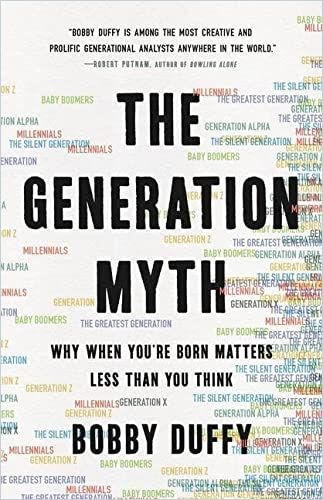Public policy expert Bobby Duffy explains how the media and lazy thinking perpetuate untruths about generational differences.

Uncovering Generational Truths
Eschew Clichés
Author Bobby Duffy, an expert on public policy, delivers a persuasive, rigorous, witty case against stereotypes and tired assumptions about generational differences. In this engaging, thought-provoking book, he deciphers social divisions and cultural change for managers, marketers, academics, and anyone who resists cliches. Duffy is also the author of Why We’re Wrong About Nearly Everything and The Perils of Perception.
To help you understand the effects of generational differences, Duffy urges you to consider people’s mindsets and behaviors in the context of their stage of life and the major events they’ve experienced. He maintains that past generations and today’s youth resemble each other more than they differ.
Bizarre complaints about the young didn’t start or stop in ancient Greece.Bobby Duffy
If human nature ever changes at all, Duffy insists, that shift happens so slowly as to be imperceptible – and it never occurs in the space of a single generation. He dismisses definitive conclusions about people based solely on their generation as evidence of severe mental laziness.
Examine Cohort Effects
Thinking rigorously of generations – or age cohorts as a group – helps explain and loosely predict significant trends. However, Duffy urges you to remember that people’s mindsets and behaviors continue to change according to their circumstances and life stage.
For example, the Great Recession of 2008 and the COVID-19 pandemic may turn out to shape the lives of millennials and Gen Z members more deeply than they shape members of older generations. Such cohort effects can inculcate people with attitudes they retain throughout their lives, making each generation different – in a general way – from past and future generations.
Younger Generations Face More Precarity
Gen X (born 1965-1980), millennials (1981-1996), or Gen Z (1995-2012 – overlapping years indicate times of transition) could become the first American generations who don’t equal or improve on their parents’ economic success. Duffy finds that today’s young people face greater barriers to housing, post-secondary education, and secure employment than any other generation in the past century.
Events of the 21st century are having a lasting effect in that they mark financial setbacks for Gen Z, millennials, and Gen X. A decades-long societal trend toward individualism, higher costs for tuition and health care, and less general support for youth contributed substantially to growing wealth gaps separating generations. Older workers are staying in the workforce longer, and robotics and AI are increasingly affecting available jobs.
Beware of Simple Stories
People embrace simple stories to explain complex phenomena. Generational consultants and the media tend to stereotype young people as anxious, unhappy, and more prone to suicide than their elders. These misleading claims reflect a shallow analysis, though they may hold true for young girls.
Duffy insists that little evidence supports the idea that using social media has a depressive effect. Although many people believe violent video games lead to aggression and lower IQ scores in children, evidence doesn’t support these conclusions either. The issues of suicide and loneliness deserve attention, but framing them as generational problems oversimplifies their causes.
The notion that happiness peaks when people are young, then hits its nadir in middle age, and increases later in life doesn’t hold up; age corresponds only mildly to happiness patterns. Duffy cites studies showing people of all generations quickly bouncing back to their personal baseline levels of happiness after setbacks.
The Baby Bust Is Real
The average age when people marry and when women become mothers has risen over the last four decades, and the rate of marriage has declined. The average number of children born per woman has dropped almost 70% since 1960. This so-called baby bust is real and worrisome, Duffy reports, but it doesn’t represent a generational shift.
For every complex problem there is a simple answer, and it’s wrong. (journalist H.L. Mencken)
Meanwhile, smoking and alcohol consumption in the United States, United Kingdom, and many other countries has declined among youth – most steeply with Gen Z, although their drug use fluctuates.
Citizens Don’t Trust Government
Duffy finds that people are abandoning their loyalty to political parties and that different generations vote in distinctive ways. Young people tend to vote for liberal and progressive candidates. Then, as people age, they tend to vote more conservatively.
The bigger problem for political parties may be the degradation in citizens’ general trust in government, but Duffy reassuringly believes that this won’t threaten democracy, at least not to the extent the media reports. Here, he ignores the actions of right-leaning politicians and pundits who seemingly try to undermine people’s faith in government.
Thanks to human nature and cognitive biases, everyone worries more about immediate problems than about future issues. The media jumped on trends suggesting millennials and Gen Z might eschew car ownership and other forms of unsustainable consumption and choose brands that appear socially conscious. Those trends have stopped or reversed. Boomers appear more likely than members of younger generations to boycott unethical brands.
Improve Intergenerational Understanding
Duffy laments that older and younger generations more and more live apart, in separate communities and homes, with little chance to interact. Digitization, online activity, and personal electronic devices exacerbate these divides.
We gain a better understanding of our changing societies when we take into account generational, life-cycle, and period effects.Bobby Duffy
For all his cynical wit, Duffy embraces a humanist, compassionate theme by the end of his book: He says people should worry less about conflicts among generations and more about generational disconnection. His good news is that intergenerational understanding boosts everyone’s development, skills, and health.
Reject Cultural Tropes
Duffy presents himself as a contrarian, but many of his perceptions aren’t actually all that contrary; they’re common-sense reactions to obviously erroneous – if seductive – cultural tropes. Many of his other perceptions are genuinely insightful and will help you resist falling for cultural myths that, he fears, are now replacing actual thought. Duffy offers a polemic against falling for the easy generalities that he believes dominate today’s cultural discussions. He shares his discovery that the members of each generation are more or less alike, except in identifiable areas where they are not. This may not seem like a groundbreaking perception, but Duffy’s illuminating explanations prove thought-provoking, at times amusing, and almost always compelling.










